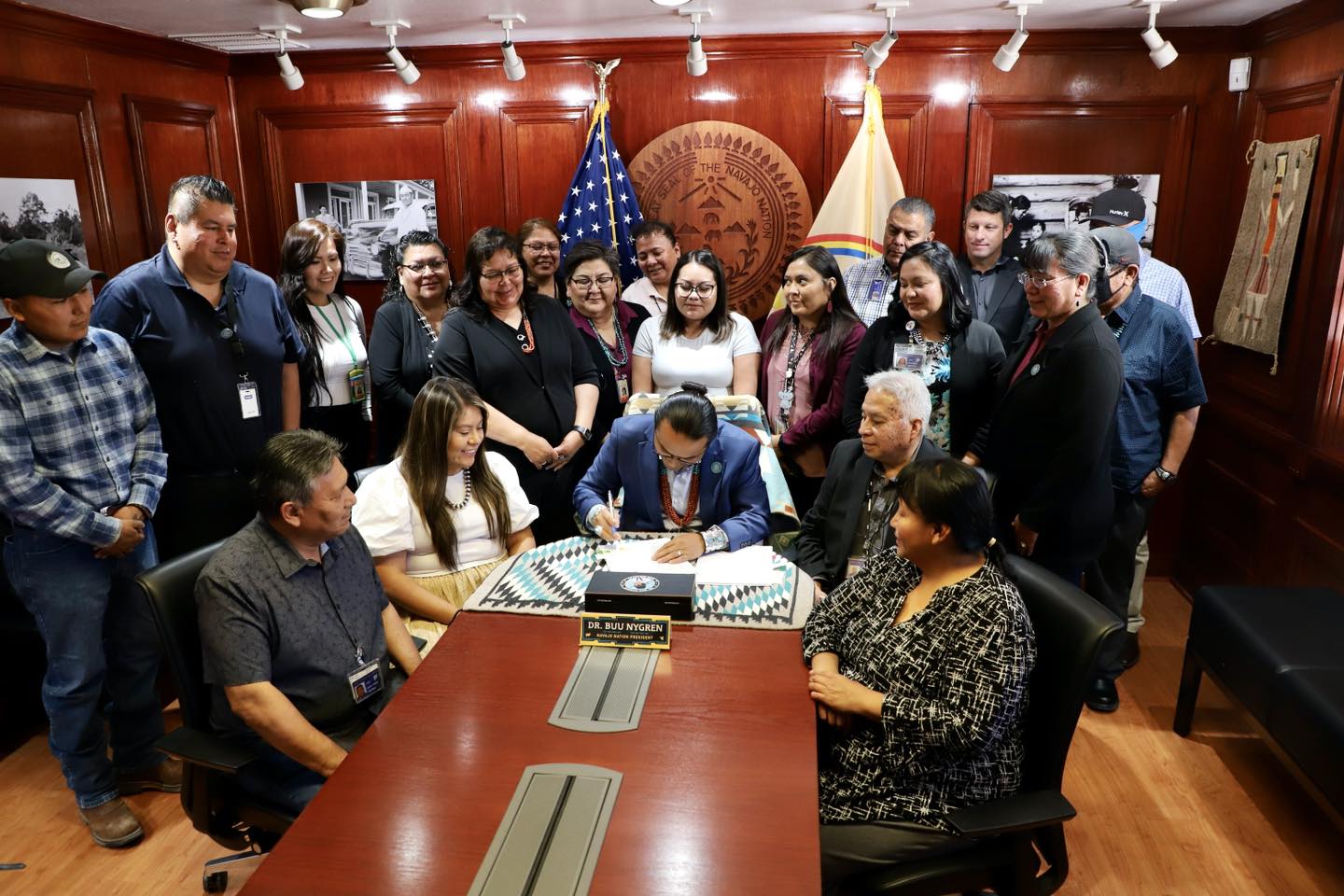
- Details
- By Native News Online Staff
Navajo Nation President Buu Nygren signed legislation on Tuesday aimed at maximizing the use of American Rescue Plan Act (ARPA) funds to boost infrastructure development across the reservation. The legislation, passed by the Navajo Nation Council on June 5, allocates $521.8 million of ARPA funding into a newly established Revenue Replacement Reserve.
According to a press release from Navajo Nation, the move is designed to create a trust fund enabling the Navajo Nation to borrow against the reserve, effectively increasing the funding available for infrastructure projects.
Nygren highlighted the unprecedented nature of this initiative, noting,
"It’s the first time the Navajo Nation has taken federal money and found a creative solution to convert it to our own unrestricted funds. The main thing is we got it done," said in the statement. "We took off the timelines and now we can have a little bit of breathing room."
The legislation addresses critical regional needs, earmarking substantial funds for various projects, including $137 million for wastewater treatment plants and $63 million for housing. Nygren emphasized that this approach ensures no ARPA funds will be returned to the U.S. Treasury, aligning with the shared goals of his administration and Navajo Nation Council Speaker Crystalyne Curley.
"This plan complies with U.S. Treasury guidelines and allows us to redeploy funds towards economic development infrastructure projects. By leveraging these funds, we aim to increase the potential investment to $800 million or even $1 billion," Nygren said.
The legislation reallocates $737.5 million in Fiscal Recovery Funds to projects most likely to be completed by the December 2026 deadline. Key allocations include:
- $137.3 million for wastewater infrastructure projects in Kayenta, Chinle, Ganado, and Shiprock.
- $62.9 million for the construction of approximately 210 homes through the Community Housing and Infrastructure Department (CHID).
- $521 million to reimburse the Navajo Nation General Fund for services provided during the COVID-19 pandemic.
- $15 million for staff of the Navajo Nation Fiscal Recovery Fund Office.
Shaandiin Parrish, chair of the Council’s Budget & Finance Committee, noted that 80% of the Navajo Nation’s ARPA funding is now obligated, leaving $200 million to be allocated before the impending deadline.
Nygren utilized his line-item veto authority to remove projects lacking equity or profit-sharing agreements with the Nation, ensuring funds are strategically leveraged. He also vetoed items with expired deadlines, preserving funding for original regional chapter plans.
The next step involves the Council passing legislation to establish the trust fund, a move Nygren urges to expedite.
"We need to act quickly to create the Trust Fund and ensure we maximize the funds placed in it. The two branches of government must collaborate to manage it responsibly," he asserted.
The signing ceremony was attended by key figures, including Chair Parrish, Fiscal Recovery Fund Office Director Lisa Jymm, Navajo Tribal Utility Authority Deputy General Manager Rex Kontz, and Navajo Nation Controller Sean McCabe, who played a pivotal role in designing the plan.
"This legislation unites President Nygren’s housing and infrastructure priorities with the Council’s objectives," Controller McCabe said. "It’s a monumental task for my first year, but I’m honored to be part of it."
The innovative plan, developed through close collaboration between the Council, Budget & Finance Committee, and FRF Office, aims to protect unobligated ARPA funds from being returned to the U.S. Treasury by the December 31, 2024, deadline. Speaker Curley highlighted the importance of this plan in safeguarding critical regional projects from federal constraints.
"This new plan frees $521 million from federal deadlines and red tape, allowing these vital regional projects to progress," Curley concluded. "We had to act to protect these dollars for our communities’ future."
More Stories Like This
Native News Weekly (August 25, 2024): D.C. BriefsNavajo Nation Gaming Enterprise Marks Problem Gambling Awareness Month With $3.4M in Support
Cheyenne River Youth Project to Celebrate Women’s Strength at Barbie-Themed Passion for Fashion on March 14
Celebrating Native American Women
Native Bidaské: The Illusion of Freedom and the Myth of America 250, Leonard Peltier Speaks Out
Help us defend tribal sovereignty.
At Native News Online, our mission is rooted in telling the stories that strengthen sovereignty and uplift Indigenous voices — not just at year’s end, but every single day.
Because of your generosity last year, we were able to keep our reporters on the ground in tribal communities, at national gatherings and in the halls of Congress — covering the issues that matter most to Indian Country: sovereignty, culture, education, health and economic opportunity.
That support sustained us through a tough year in 2025. Now, as we look to the year ahead, we need your help right now to ensure warrior journalism remains strong — reporting that defends tribal sovereignty, amplifies Native truth, and holds power accountable.
 The stakes couldn't be higher. Your support keeps Native voices heard, Native stories told and Native sovereignty defended.
The stakes couldn't be higher. Your support keeps Native voices heard, Native stories told and Native sovereignty defended.
Stand with Warrior Journalism today.
Levi Rickert (Potawatomi), Editor & Publisher

